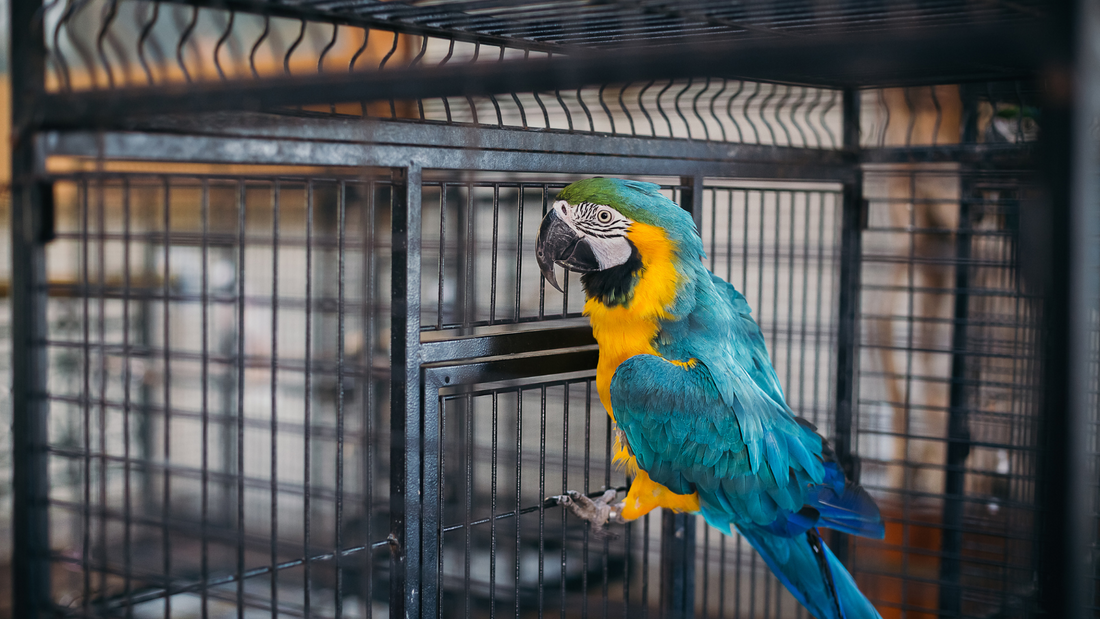I remember the first time I wanted a bird!
It made me so worried. My mind was racing with questions. My biggest concern was how to keep my bird safe, healthy, and happy.
My first thought was to find her the right home.
Today, bird cages come in a wide variety of sizes, colors, and models, making it easy to become overwhelmed by the options.
This is why we have created a few simple tips to help you choose the right cage for your feathered friend.

Placement and location: how do you choose?
As social creatures, birds love to be part of the family, so the cage should be near an active part of your home to promote your pet's social development.
Direct sunlight, extreme heat or cold, fireplaces, wood-burning stoves, exterior doors, and overhead heating/air conditioning vents should be avoided where your bird will be located. Place birdcages away from kitchens and other places where smoke may accumulate; birds have very sensitive lungs and are susceptible to smoke and strong odors.
What size Is right for your bird?
Pet bird cages are more like homes than cages for birds. Ideally, a bird cage should be large enough for the bird to walk around comfortably and spread her wings fully. In addition to providing enough space for the bird to rest, play, and exercise, it should also provide a safe environment.
Always keep your bird's overall size in mind. Birds like finches and canaries can be kept in small cages, but larger birds require larger cages to prevent behavior problems.
Except for small flighted birds like canaries and finches, which need equal room to fly, the width of the cage is more critical than the height. Make sure the cage is twice as wide as your bird's wingspan.
Be sure to consider the space your bird will lose when it has a perch, a food bowl, and toys!
As a general rule, you should choose a cage that's as big as possible. It is also recommended that multiple bird cages are even bigger.
How should bird cage bars be spaced?
Bar spacing is another factor to consider when selecting a cage, which is the most straightforward and non-negotiable. A cage's bar spacing refers to the distance between its bars. Proper bar spacing will not only prevent escapes and injuries, but also encourage physical activity, such as climbing, flying, or playing. For smaller birds like parakeets and lovebirds, the space between bars shouldn't be much more than 1.5 cm. In this way, they will not be able to squeeze through or become stuck between the bars.
It is also very important to consider how the bars are aligned. Birds that are smaller and lighter can jump and play on vertical bars, but larger birds may not be able to do so. For larger birds, consider cages that feature horizontal bars that provide excellent support.
Cage bars should be spaced far enough apart not to trap toes or wings but close enough to prevent small heads from getting stuck.
How can I choose the most convenient bird cage style?
It is also important to consider the cage's style. Veterinary experts say that round cages are harmful to birds' psychological health, so angled cages are recommended. Bird cages come in a variety of sizes and shapes that can accommodate a variety of species.
You have so many options to choose from. Play Top Cages allow birds to rest and play outside of cages. With a dome top cage, you can get more height inside the cage. Considering you won't have any playpen or playtop for the bird to use outside the cage, you should get a playstand in addition. Cages with flat tops can be fitted with a play gym or supplies. Other cages can also be stacked - although double or triple-stacked cages are also possible. The floor-based cages are usually larger than traditional cages. These cages are only recommended if you have enough floor space and don't mind using it for your pet. Tabletop cages are smaller and more portable, so they are highly recommended if you move your pet's cage frequently. The most convenient cages in terms of space are those that hang. No matter where you place them, they won't affect the overall arrangement of your furniture or décor.
Regardless of which top you ultimately go with, it's important that your bird has some sort of activity center outside of the cage and is able to utilize it on a daily basis.
Which materials are most durable for bird cages?
Metal has traditionally been the material of choice for bird cages. It is common to find cages on the market today that are powder-coated, which is a textured finish applied to wrought iron cages that come in a variety of colors. But it is also possible to find cages made of other metals, such as bronze, wrought iron, and others. Also available are some wooden bird cages that are very strong. The cost of wood is relatively high compared to the cost of stainless steel or wrought iron. The cage can, however, have a unique sense of style that metal cages cannot offer.
A variety of reasons contribute to the popularity of stainless steel. The first benefit is that it is durable and sturdy. Stainless steel cages are also easier to keep sanitary for your bird. Additionally, you can customize the cage to match your style, whether you want it chrome-plated or colored. It's the smart way
Lastly, some final thoughts
Getting your birdcage setup started involves a lot of considerations. It is essential to keep the cage clean and provide an adequate amount of space. Cheap cages constructed poorly can contain toxic materials and pose a safety risk. The cost of a cage from a reputable pet supply may be higher, but it will be worth it in the long run.
To make your bird's cage both functional and comfortable, be sure to add perches, bedding, bowls and bird baths. In addition, add toys for stimulation in order to make your bird's home as enjoyable as possible.
The food and water dishes should always be placed in the upper portion of the cage to avoid contamination by droppings. Smaller cages benefit from exterior-mounted water bottles.
The joy, happiness, and companionship a bird brings to your home is priceless. Every bird's lifestyle and living situation is unique. Providing your pet with an appropriate living space that meets his or her individual needs can be a real challenge.
With our list of the best bird cages for sale, we hope you will find the most suitable cage for your pet bird.
Your Choice Is Now!





